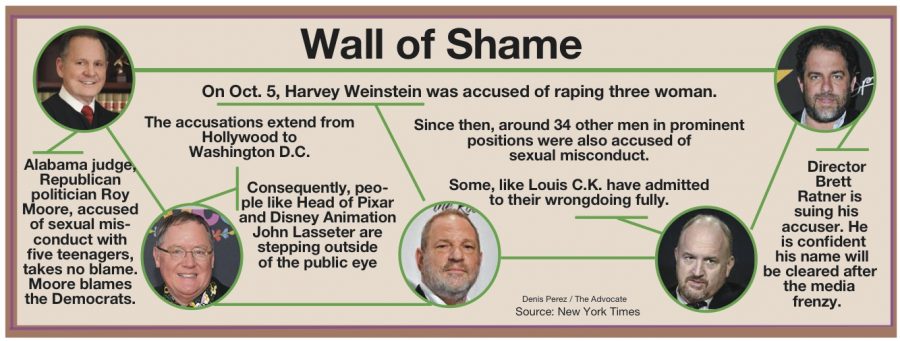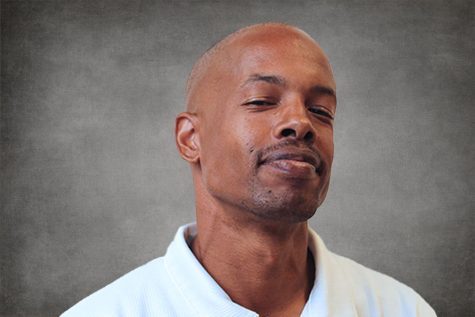Expectations blur collective morality
Sexual assault allegations, misconduct accusations block support of public
Dec 11, 2017
In light of the recent deluge of complaints of sexual misconduct, sexual assault and in some cases pedophilia among prominent public figures, it is becoming more difficult to delineate the moment when inappropriate behavior becomes unacceptable.
This year, beginning with the now infamous “Access Hollywood” “grab them by the p***y” comment by President Donald Trump and the lack of consequences it incurred, women have began to expose years of predation men in all walks of life.
For some people, accusations of rampant misconduct is a deal-breaker in terms of support, however, others increase their support for people mired in scandal.
“Too many people hide their own and circle the wagons around their own and that allows the behavior to perpetuate. People make excuses for the people that they need to be nice to advance other interests,” political science department Chairperson Vanna Gonzales said.
“At a certain point people need to take an ethical and moral stance and call out what is unacceptable. Men, in particular, have an obligation to do that. We can’t just rely on the females to come forward because it’s too easy to paint them as victims — rather than just doing what’s right.”
Since Oct. 5, when film producer Harvey Weinstein was initially accused of rape and sexual misconduct, 34 men and counting, mostly politicians and entertainment executives, have been accused abhorrent behavior, according to reporting in the New York Times.
Some of the more recognizable names from the list are the U.S. senator from Minnesota Al Franken, Alabama judge and politician Roy Moore and most recently NBC “Today” show host Matt Lauer.
Although all of the perpetrators are men, all of the victims are not women.
Actors Anthony Edwards (Goose from “Top Gun”), Corey Feldman and Terry Cruz all made recent allegations against Hollywood executives in recent months.
Cruz filed a police report with the LAPD accusing executive Adam Venit of groping him, in front of his wife, at an industry party in 2016.
Venit was subsequently suspended from his job.
“I like to view things holistically. If someone has done something catastrophic that endangers or harms someone else then I won’t support them any more,” ASU President Alex Walker-Griffin said.
“For example, the allegations against Roy Moore, although I’m not a Republican, to people that are Republicans, because of the allegations that are coming out that he sexually assaulted people, I don’t think you should support that person. I don’t want people to profit off of something that they may have done that is completely awful.”
In different areas of public life, people have alternate means of aligning their own moral compass.
Music department Chairperson Wayne Organ finds inspiration in the music of jazz great Miles Davis, however, after reading his autobiography, the professor had to separate the art from the artist — in a way.
“I remember thinking I admire this guy for his art but I certainly don’t admire him as a person. You gotta separate out those two things. The older I got, the more I realized that everybody is messed up in some sort of way,” Organ said.
“If I’m looking at a person making policy and their behavior doesn’t support that policy — I’m done with you. That’s hypocrisy.”
Organ sees Davis’ personal shortcomings differently.
“There is nothing that says Miles Davis was being hypocritical because he wasn’t trying to tell people how to live their lives and then doing the opposite,” he said.
“Just because the creator gave you the ability to do something doesn’t mean he gave you the ability to be a good person. Davis was a world-class a-hole.”
Sexual infractions are not always a contributing factor of what blurs the lines of morality, acceptance and rejection.
People use their own sense of righteousness and justice to determine when it is time to end support of an artist or public figure, especially if domestic violence or sexual misconduct are not issues.
In many cases, all it takes is a violation of one’s personal moral code, not a legal infraction, to be exiled from the list of acceptability.
“I remember loving Alicia Keys’ music when she first began her career and then she started messing around with (music producer) Swizz Beats who was married at the time. I had to draw the line. That changed my outlook on her — I can’t support that,” CCC instructional assistant Vanessa Johnson said. “I watched Bill Cosby on the ‘Cosby Show’ when I was young but seeing the news, I can’t support him either.”
Johnson said what she really can’t support is the way victims are blamed.
“What a lot of people don’t realize is that it takes some women a long time to come out and report what they have been through — it takes a lot,” she said. “When R. Kelley’s music comes on the radio, I change the station, especially his song ‘Fiesta.’ To me, the chorus sounds like molester, molester. It gets harder when it comes to Michael Jackson’s allegations because he’s so famous.”
Both Kelly and Jackson were accused of molesting children, far below the age of legal consent.
Recently, it was discovered that Kelly keeps a bevy of women in one of his many estates, some against their will, for his own sexual gratification.
In many, morality exists like a living organism, evolving as life experiences change, however, as the number of allegations grow, humans have a tendency to pile on without all of the necessary facts to foster an informed opinion.
“In environments like this, there is a tendency to bandwagon. People see an opening and they’re going to jump on it,” Gonzales said. “Things are happening and then a lot of dynamics kick in — media, allies and opponents — then things start to get away (from facts).”



